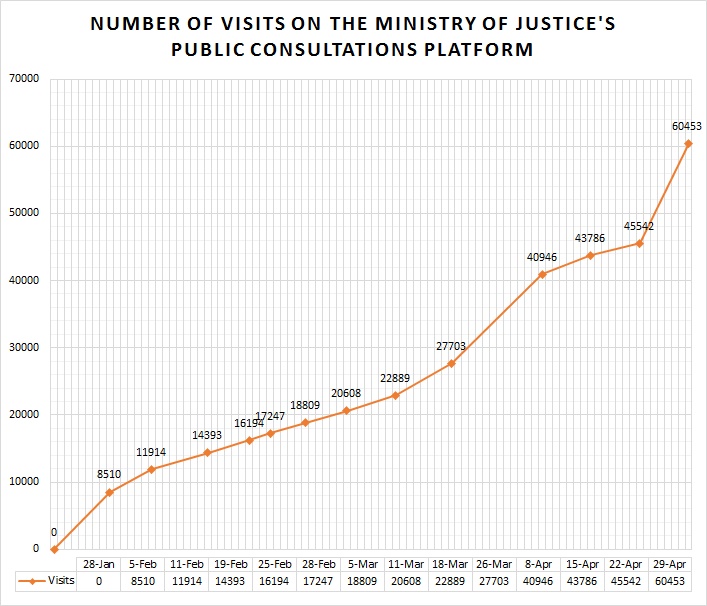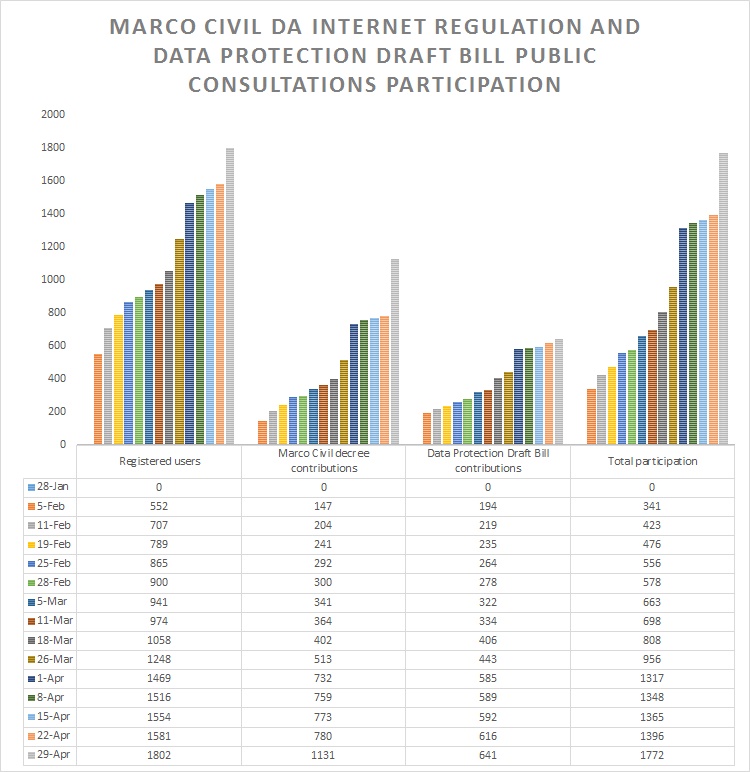
InternetLab Reports – Public Consultations No. 13
Check below the goings-on of the public debate on the Marco Civil da Internet regulation and the Data Protection draft bill.
Numbers and statistics

Source: Ministry of Justice

As occurred in the last days before the deadline extension, the platform provided by the Ministry of Justice received a greater number of visits and comments over the last days. The trend was reproduced and this deepened the perception that in public consultations of this kind the discussion takes more defined shapes near the end of the deadline.
The end of the consultation on the regulation of Marco Civil
Today (April 30) the public debate on the Marco Civil da Internet regulatory decree ended. The debate, which began on January 28, 2015, proceeded in ways very similar to the consultation process which discussed and originated the Marco Civil Internet itself, today Federal Law No. 12.965/2014.
While the debate about the law focused on the principles of internet in Brazil and the rights of users, the discussion of the decree was helpful to gather opinions from various sectors about how these general provisions of the Marco Civil should be put into practice. At several points, we could see the conflicting opinions clash on various topics, including those involving highly complex issues and important technical details.
The opening of dialogue with the population, companies and the organized civil society is an important institutional learning on the development of rules and regulations that influence the life of a large part of the population. The Ministry of Justice, through the project Pensando o Direito, has systematically been using this strategy. The debate on the regulation of Marco Civil is part of this trend and serves at least to map arguments and possible consensus on the future decree, informing in a qualified manner the decision-making of legitimate authority to do so (that is, in this case the Presidency of the Republic).
The InternetLab tried to promote and support the debate through these weekly newsletters. In this next step, with the end of the consultation about the decree, we seek to carry out a systematization of the contributions and an overall review on how the debate was. We will do this through a Final Report that seeks to address all of the central arguments of the main points of discussion in the decree.
Remember, we will continue publishing the weekly InternetLab Reports on the public consultation of data protection draft bill, which continues until July 5.
Data protection: consent waiver for use of data relating to rights and duties by the public administration
Article 11 of the Data Protection draft bill deals with situations in which data may be processed without the consent of the citizens who are the holders. The more general situation is that related to data that are is already of unrestricted access, such as results of examinations and pieces of information about public officials in transparency portals. However, the article also provides for other exceptions in which there is no need for consent. Among them is the section II, which has caused debate on the platform:
II – processing and sharing of data relating to the exercise of rights or duties provided for in laws or regulations by the government;
As you can see, this exception aims to facilitate the work of the public administration within its legal powers. On the side of the government, the work could get very stiffened if it was necessary to request consent for all cases of treatment. Participants of the public debate, in the meantime, have not accepted the arrangement unanimously.

The function of the item is recognized on the platform, including the participant tagwato, who argues that, based on his experience as a public official, this permission to the administration to treat data without consent should be even greater to facilitate “making demarches, notices and subpoenas”.
The opinion of tagwato, however, finds no echo among the other participants of the platform. On the contrary, all other contributions in this section require better specification and restriction of this legal opening for data processing without consent. Participants believe that the clause opens the door to violations of the right to privacy of citizens.
It is true that the need to respect laws and regulations to carry out these processing represents some control of the activities of the public administration. But in view of the guiding principles of the draft bill itself, listed in Article 6, maybe it is necessary a better detail of what would these “rights and duties” be and what are the purposes of the processing of such data.
The comment of the participant Prof. Marcos goes in this direction:
“The government should follow at least the same principle of informing the specific purpose of data collection”.